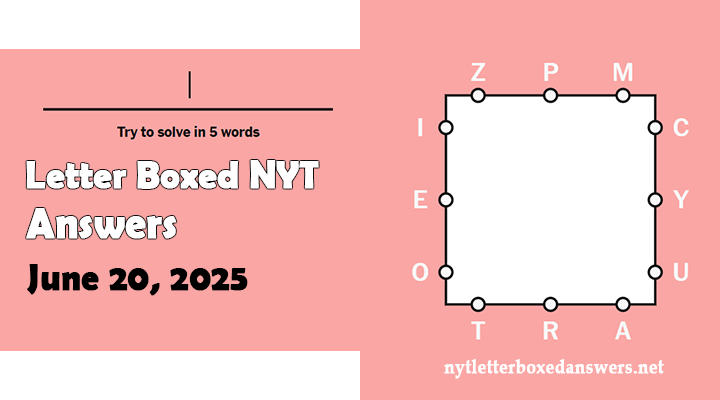NYT Letter Boxed quiz for Friday June 20, 2025 is released. We came up with Letter Boxed June 20 2025 Answers and Hints for you. With the help of these hints, you will be able to guess the words of letter boxed quiz without revealing the answers and get the solution.
| Top | Right | Bottom | Left |
|---|---|---|---|
| ZPM | CYU | TRA | IEO |
| Two Words Solution | ||
|---|---|---|
| MYOPIC | CAUTERIZE | |
| ACOUP | PROZYMITE | |
| AMAZE | EURYTOPIC | |
| APTERIUM | MICROZYME | |
| Three Words Solution | ||
|---|---|---|
| AIM | MYOPIC | CAUTERIZE |
| AMA | AZURE | ACOTYPIC |

Word 01:
This 6-letter word starts with M and ends with C; describes nearsightedness or narrow-mindedness.
A person who struggles to see distant objects.
Also means lacking foresight or long-term vision.
Common term in ophthalmology and metaphorical contexts.
Associated with prescription glasses or contact lenses.
Opposite of farsighted (hyperopic).
Figuratively used to describe short-sighted decisions.
Derived from Greek muōps, meaning to squint.
May cause squinting or eye strain.
Both literal and metaphorical term for limited vision.
Word 02:
This 9-letter word starts with C and ends with E; means to burn tissue to stop bleeding or prevent infection.
Used in surgery and battlefield medicine.
Derives from Greek kautērion, meaning branding iron.
Once done with hot metal, now often done with lasers.
Sometimes used metaphorically: “cauterize the wound of betrayal.”
A method to sterilize or seal injuries.
Prevents further damage by sealing exposed areas.
Appears in medical and historical novels.
Requires precision and care to avoid damage.
Also spelled with an “s” in British English: cauterise.
Word 01:
This 5-letter word starts with A and ends with P; non-standard or rare, possibly fictional or coined.
Sounds like a blend of “acoustic” and “group.”
Could be interpreted as a musical or sound-related term.
May serve as a fantasy or sci-fi term.
Not found in common dictionaries.
Possible typo, acronym, or niche jargon.
Creative term open to interpretation in fiction.
Might suggest a sound unit or cluster.
Could work as a codename or system label.
Phonetically resembles “a coop.”
Word 02:
This 9-letter word starts with P and ends with E; a rare or possibly fictional biochemical term.
Sounds like a compound involving enzymes or proteins.
May be coined for scientific or sci-fi use.
Could imply precursor to enzymatic action.
Ends in “-ite,” often used for minerals or particles.
Could be interpreted as a biological catalyst.
Might appear in laboratory or academic fiction.
Fits in synthetic biology or genetic engineering contexts.
May be used metaphorically to describe potential energy.
Similar form to biochemical vocabulary.
Word 01:
This 5-letter word starts with A and ends with E; means to astonish or surprise greatly.
Often the result of witnessing something impressive.
Synonym: astonish, astound, stun.
Used to describe reactions to magic tricks or miracles.
From Middle English amasen, meaning “to bewilder.”
Can be caused by skill, beauty, or unexpected events.
Found in phrases like “to amaze the audience.”
The feeling a child has seeing fireworks for the first time.
Can describe reactions in both positive and negative ways.
Related to wonder and awe.
Word 02:
This 9-letter word starts with E and ends with C; describes species that can thrive in a wide range of environments.
Ecological term; opposite of stenotopic.
Adaptable organisms like raccoons or cockroaches.
Common in ecological and environmental studies.
Prefix “eury-” means broad, “-topic” means place.
Implies high environmental tolerance.
Key concept in biodiversity discussions.
These species may survive climate shifts better.
Indicator of ecological flexibility.
Found in biology and evolutionary science.
Word 01:
This 8-letter word starts with A and ends with M; anatomical term referring to featherless skin on birds.
Found between feather tracts in birds.
Important in avian physiology and taxonomy.
From Greek a- (without) + pteron (feather).
May help in regulating body temperature.
Can be seen in plucked birds or during molting.
Often studied in ornithology.
Useful in identifying species and flight mechanics.
Paired with “pterylae,” which are feathered areas.
Rare outside of zoological texts.
Word 02:
This 9-letter word starts with M and ends with E; historical term for microscopic organisms or enzymes.
Outdated synonym for bacteria or microbial agents.
May appear in old biology literature.
Could also refer to a minute enzyme.
“Micro” = small, “zyme” = fermenting agent.
Related to digestion, fermentation, or decay.
Superseded by more precise terms like enzyme or microbe.
Still seen in historical or classical science references.
May refer to catalysts in biological systems.
Combines Greek roots for “small” and “leaven.”
Word 01:
This 3-letter word starts with A and ends with M; means to direct something toward a target.
Can be physical (with weapons) or metaphorical (goals).
Synonym of “intend” or “target.”
Used in archery, shooting, and planning.
As a noun, it means the goal or objective.
Essential in strategy and games.
Often paired with “fire” in military commands.
Appears in expressions like “take aim.”
Also acronym for AOL Instant Messenger.
Crucial in project management and personal goals.
Word 02:
This 6-letter word starts with M and ends with C; describes nearsightedness or narrow-mindedness.
A person who struggles to see distant objects.
Also means lacking foresight or long-term vision.
Common term in ophthalmology and metaphorical contexts.
Associated with prescription glasses or contact lenses.
Opposite of farsighted (hyperopic).
Figuratively used to describe short-sighted decisions.
Derived from Greek muōps, meaning to squint.
May cause squinting or eye strain.
Both literal and metaphorical term for limited vision.
Word 03:
This 9-letter word starts with C and ends with E; means to burn tissue to stop bleeding or prevent infection.
Used in surgery and battlefield medicine.
Derives from Greek kautērion, meaning branding iron.
Once done with hot metal, now often done with lasers.
Sometimes used metaphorically: “cauterize the wound of betrayal.”
A method to sterilize or seal injuries.
Prevents further damage by sealing exposed areas.
Appears in medical and historical novels.
Requires precision and care to avoid damage.
Also spelled with an “s” in British English: cauterise.
Word 01:
This 3-letter word starts with A and ends with A; acronym for “Ask Me Anything.”
Common format on Reddit and online interviews.
Also stands for American Medical Association.
In Polynesia, it’s the outrigger of a canoe.
May refer to Japanese female pearl divers.
Context-dependent term with several meanings.
Popular among celebrities and experts online.
Useful for interactive Q&A sessions.
Seen in live chat and forum discussions.
Could also appear as a brand or nickname.
Word 02:
This 5-letter word starts with A and ends with E; means bright blue like a clear sky.
Often used in poetry to describe the heavens.
Name of a Microsoft cloud computing platform.
Derived from Persian lazhward, meaning blue.
Popular in art and heraldry for vivid blue shades.
Symbolizes calmness, trust, or infinity.
Found in descriptions of oceans and gemstones.
Frequently paired with silver or gold in design.
Appears in romantic and nature-related metaphors.
A color between cyan and sky blue.
Word 03:
This 8-letter word starts with A and ends with C; a rare or technical term, possibly coined or specific to niche fields.
May suggest deviation from a typical form.
“Aco-” prefix implies without; “-typic” relates to type or class.
Could be used in taxonomy or morphology.
Not common in mainstream language.
Possibly used in academic or specialized writing.
Could describe atypical or variant features.
Might be found in scientific classification texts.
Suitable for creative or technical interpretation.
Has potential for speculative or fictional usage.

Chris Brown is a passionate word game love and problem solving expert. With over 15 years of experience in solving puzzle challenges, he provides daily NYT Letter Boxed answers, tips and strategies to help other players so that they can improve their solving skills. Whether you are stuck on a tricky puzzle or looking for new techniques, Chris is here to guide you with his expert solutions.